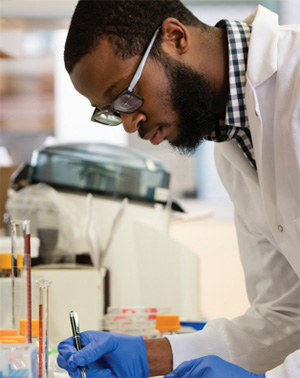What Makes our Program Uniquely Positioned?

The strength of our MS in Regulatory Science program is its science-driven approach to drug and biologic product development and regulation. The program is internationally recognized and is further strengthened by the University of Maryland’s Center of Excellence in Regulatory Science and Innovation (M-CERSI), the oldest FDA-funded academic center for regulatory science, whose success has led to several more centers at other universities.
Designed for high-performing working professionals, the MS in Regulatory Science program is a part-time, online two-year program. Student retention is over 95 percent. Through the program, students have access to a Regulatory Science Advisory Panel for career advice. Although exclusively online, most students visit campus for extracurricular events, such as student/alumni events, industry and FDA field trips, and graduation.
Support Scholarships in Regulatory Science
The field of regulatory science offers excellent career potential for individuals interested in developing medical products, such as drugs, biologics, devices, vaccines, and blood products. While the medical products industry – and the governmental agencies required to protect the public - is large, there are still unmet needs for professionals with knowledge to develop and assess medical products, as well as safety to maintain them in the marketplace, including for new uses. Advanced education in regulatory science aids career advancement and increases individual salaries.
Contact Greer Griffith, MS, executive director of development at the School of Pharmacy, at ggriffith@rx.umaryland.edu, to learn how you can support scholarships in regulatory science.
The goal of this campaign is to secure funding for scholarships and fellowships for individuals from underserved communities or backgrounds and enrolled in the MS in Regulatory Science program at the University of Maryland School of Pharmacy in order to create opportunities and amplify needed voices in this field. Regulatory science is the science of developing new tools, standards, and approaches to assess the safety, efficacy, quality, and performance of FDA-regulated products. The School of Pharmacy launched a MS in Regulatory Science program in 2013. The strength of the MS program is its science-driven approach to drug and biologic product development and regulation.
Why Is Diversity in Regulatory Science Needed?
Diversity in biomedical sciences is critical, especially in the field of regulatory science, which impacts medication development. By strengthening, supporting, and encouraging the voices of talented individuals of diverse backgrounds in regulatory science, we can better address disparities in health care.
What Makes our Program Uniquely Positioned?
The strength of our MS in Regulatory Science program is its science-driven approach to drug and biologic product development and regulation. The program is internationally recognized and is further strengthened by the University of Maryland’s Center of Excellence in Regulatory Science and Innovation (M-CERSI), the oldest FDA-funded academic center for regulatory science, whose success has led to several more centers at other universities.
Designed for high-performing working professionals, the MS in Regulatory Science program is a part-time, online two-year program. Student retention is over 95 percent. Through the program, students have access to a Regulatory Science Advisory Panel for career advice. Although exclusively online, the vast majority of students elect to visit campus for extracurricular events, such as student/alumni events, industry and FDA field trips, and graduation.
Campaign Goals and Progress
$3 million dollars in funding will need to be raised in order to provide 100 full-tuition scholarships to students enrolled the MS in Regulatory Science program over 10 years. Commitments have been secured for 11 scholarships. Bristol Myers Squibb (BMS) has provided a scholarship that is supporting Alexandra Mata (entered Fall 2023). Ellen Yankellow has provided two scholarships that will start in each Fall 2024 and Fall 2025 (four total). An anonymous donor has provided three scholarships that will start in each Fall 2024 and Fall 2025 (six total).
It will take an additional investment of $1.7 million dollars in order to fund and train an additional 10 regulatory science fellows in interventional clinical research over the next 10 years.
Contact Greer Griffith, executive director of development, to learn how you can support the campaign today.
How to Apply for a Scholarship
We are currently seeking applicants for four scholarships that start in Fall 2025. Scholarships for students from underserved communities or backgrounds in regulatory science reflects the University of Maryland School of Pharmacy’s commitment to Pharmapreneurship®.
Learn more about the application process.
